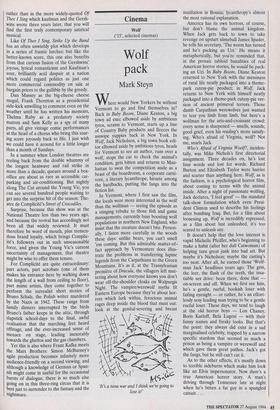Cinema
Wolf (`15', selected cinemas)
Wolf pack
Mark Steyn
Where would New Yorkers be without Vermont to go and find themselves in? Back in Baby Boom, Diane Keaton, a big town ad exec elbowed aside by ambitious tyros, scrams to Vermont, starts up a line of Country Baby products and fleeces the asswipe yuppies back in New York. In Wolf, Jack Nicholson, a big town book edi- tor elbowed aside by ambitious tyros, heads for Vermont to see an author, runs over a wolf, stops the car to check the animal's condition, gets bitten and returns to Man- hattan to swat the competition aside as a beast of the boardroom, a corporate carni- vore, a literary lycanthrope, hirsute among the hardbacks, putting the fangs into the fiction list.
In Vermont, where I first saw the film, the locals were more interested in the wolf than the wolfman — seeing the episode as a stinging rebuke to those fish and game managements, currently busy boosting wolf populations in northern New England, who insist that the creature doesn't bite. Person- ally, I listen more carefully in the woods these days: unlike bears, you can't smell 'em coming. But this admirable matter-of-- fact approach by Vermonters does illus- trate the problems in transferring lupine legends from the Carpathians to the Green Mountains. It's as if, at the Transylvanian premiere of Dracula, the villagers left mut- tering about how everyone knows you don't wear off-the-shoulder cloaks on Walpurgis Night. The vampire/werewolf myths fit Eastern Europe because they're about hor- rors which lurk within, ferocious animal rages deep inside the blood that must out: look at the genital-severing and breast It's a tuna war and I think we're going to lose it!' mutilation in Bosnia; lycanthropy's almost the most rational explanation.
America has its own horrors, of course, but don't blame the animal kingdom. When Jack gets back to town to take revenge on upstart slimeball James Spader, he tells his secretary, 'The worm has turned and he's packing an Uzi.' He means it metaphorically, but you're reminded that, in the prosaic tabloid banalities of real American horror stories, he would be pack- ing an Uzi. In Baby Boom, Diane Keaton returned to New York with the messiness of rural life neatly packaged into a theme- park cutesy-pie product; in Wolf, Jack returns to New York with himself neatly packaged into a theme-park cutesy-pie ver- sion of ancient primeval terrors. Those dumb Carpathian werewolves just wanted to tear you limb from limb, but here's a wolfman for the arts-and-croissant crowd: every sense is sharpened — smells, sounds; good grief, even his reading's more satisfy- ing. Who's afraid of Virginia, wolf? Not me, snarls Jack.
Who's Afraid of Virginia Woolf?, inciden- tally, was Mike Nichols's first directorial assignment. Three decades on, he's lost four words and lost for words. Richard Burton and Elizabeth Taylor were hairier and scarier than anything here. Wolf, as is the fashion, is a psychological horror film, about coming to terms with the animal inside. After a night of passionate wolfing, Jack declares, 'I feel good' — the standard talk-show formulation which even Presi- dent Clinton used to describe his feelings after bombing Iraq. But, for a film about loosening up, Wolf is incredibly repressed; as a film about lust unleashed, it's too scared to unleash any.
It doesn't help that the love interest is vapid Michelle Pfeiffer, who's beginning to make a habit (after her dull Catwoman) of helping turn great junk into bad art. But maybe it's Nicholson; maybe the casting's too neat. After all, he earned those 'Wolf- man Jack' headlines years ago. The grin, the leer, the flash of the teeth, the insa- tiable sex drive: been there, done that on-screen and off. When we first see him, he's a gentle, rueful, bookish loser with failing eyesight — or rather, he's an effort- lessly sexy leading man trying to be a gentle rueful loser. These days, we tend to laugh at the old horror boys — Lon Chaney, Boris Karloff, Bela Lugosi — with their funny names and freaky looks. But that's the point: they always did exist in a sad marginalised celebrity, trapped by a narrow specific stardom that seemed as much a prison as being a vampire or werewolf and which gave them great pathos. Jack's got the fangs, but he still can't cut it.
As to the other effects, it's mostly down to terrible sideburns which make him look like an Elvis impersonator. Now there's a true American horror story. A man's driving through Tennessee late at night when he's bitten a fat guy in a spangled catsuit.


























































 Previous page
Previous page